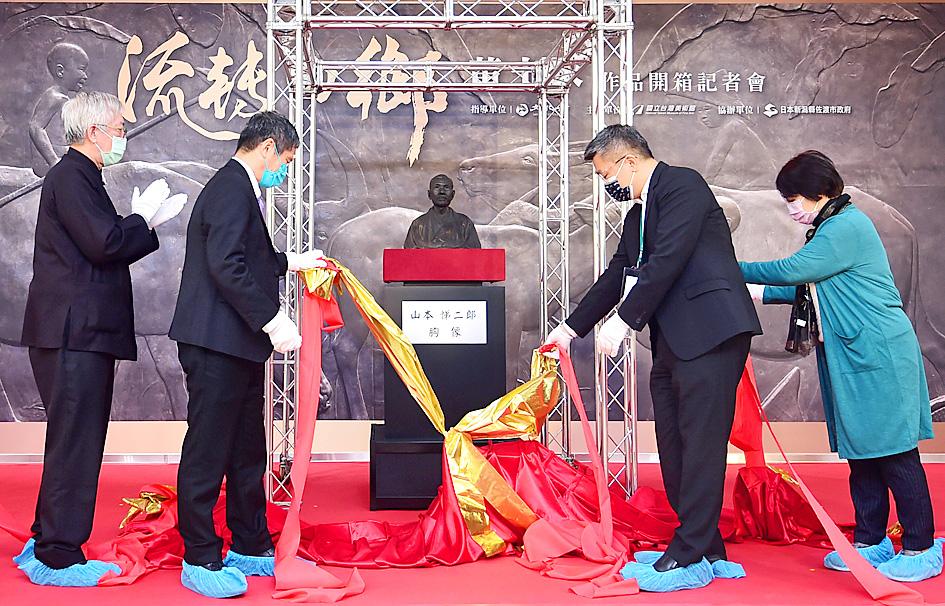The National Taiwan Museum of Fine Arts on Friday held an unboxing ceremony for Taiwanese sculptor Huang Tu-shui’s (黃土水) bust of Japanese agronomist, entrepreneur and politician Teijiro Yamamoto, which arrived last month from Sado in Japan’s Niigata Prefecture, on a three-year loan to the museum.
The museum is to restore and plan an exhibition of the work — titled Teijiro Yamamoto — as well as create a replica of the piece for its collection, the Ministry of Culture said in a statement.
Minister of Culture Lee Yung-te (李永得), Deputy Legislative Speaker Tsai Chi-chang (蔡其昌), museum Director Liang Yung-fei (梁永斐) and Huang’s relative Lin Li-chun (林麗純) were among those who attended the ceremony at the Taichung-based museum.

Photo: Liao Yao-tung, Taipei Times
Huang, who lived from 1895 to 1930, was a great artist and the first Taiwanese artist to study in Japan, Lee said.
Huang’s works were selected many times for the Japanese Imperial Art Exhibition, Lee said, describing him as a pioneer in his field.
Over the past few years, the ministry has been committed to rebuilding Taiwanese art history, Lee said, adding that the arrival to Taiwan of Huang’s work marks an important milestone in the project.
He hopes the museum would complete the restoration and reproduction of the bust in two years, and search for other works by Huang, as well as works by other modern sculptors to be exhibited alongside it, Lee said.
The museum holds in its collection two replicas of Huang’s works made from the originals — Water Buffaloes (水牛群像) and Sakya (釋迦出山), the ministry said.
The former is on permanent display in the lobby of the museum, the ministry said.
Huang was commissioned by many members of Japan’s gentry to create bronze busts, one of whom was Yamamoto, it said.
Born in Sado, Yamamoto had a deep connection with Taiwan’s sugar industry, it said.
The piece Teijiro Yamamoto could travel to Taiwan thanks to coordination efforts by Representative to Japan Frank Hsieh (謝長廷) and Chang Su-chen (張素真), a Taiwanese dancer who resides in Japan, Liang said.
It arrived at the museum on Dec. 21 last year — a day that held special significance as it coincided with the 90th anniversary of the artist’s death, he said.
Liang said he looks forward to tracking down more works by Taiwanese artists that are located overseas for a more complete view of Taiwanese art history.
A team of experts from Taiwan and Japan are to carry out the three-year project, the ministry said.
The loan follows an agreement signed by the ministry and the museum, and the Sado city government in May last year, it said.
The bust of Yamamoto is one of four portrait sculptures by Huang located in Japan, it said.

Taiwan is stepping up plans to create self-sufficient supply chains for combat drones and increase foreign orders from the US to counter China’s numerical superiority, a defense official said on Saturday. Commenting on condition of anonymity, the official said the nation’s armed forces are in agreement with US Admiral Samuel Paparo’s assessment that Taiwan’s military must be prepared to turn the nation’s waters into a “hellscape” for the Chinese People’s Liberation Army (PLA). Paparo, the commander of the US Indo-Pacific Command, reiterated the concept during a Congressional hearing in Washington on Wednesday. He first coined the term in a security conference last

Prosecutors today declined to say who was questioned regarding alleged forgery on petitions to recall Democratic Progressive Party (DPP) legislators, after Chinese-language media earlier reported that members of the Chinese Nationalist Party (KMT) Youth League were brought in for questioning. The Ministry of Justice Investigation Bureau confirmed that two people had been questioned, but did not disclose any further information about the ongoing investigation. KMT Youth League members Lee Hsiao-liang (李孝亮) and Liu Szu-yin (劉思吟) — who are leading the effort to recall DPP caucus chief executive Rosalia Wu (吳思瑤) and Legislator Wu Pei-yi (吳沛憶) — both posted on Facebook saying: “I

Sung Chien-liang (宋建樑), who led efforts to recall Democratic Progressive Party (DPP) Legislator Lee Kun-cheng (李坤城), was released on bail of NT$80,000 today amid outcry over his decision to wear a Nazi armband to questioning the night before. Sung arrived at the New Taipei District Prosecutors’ Office for questioning in a recall petition forgery case last night wearing a red armband bearing a swastika, carrying a copy of Adolf Hitler’s Mein Kampf and giving a Nazi salute. Sung left the building at 1:15am without the armband and covering the book with his coat. Lee said today that this is a serious

The Ministry of Economic Affairs has fined Taobao NT$1.2 million (US$36,912) for advertisements that exceed its approved business scope, requiring the Chinese e-commerce platform to make corrections in the first half of this year or its license may be revoked. Lawmakers have called for stricter enforcement of Chinese e-commerce platforms and measures to prevent China from laundering its goods through Taiwan in response to US President Donald Trump’s heavy tariffs on China. The Legislative Yuan’s Finance Committee met today to discuss policies to prevent China from dumping goods in Taiwan, inviting government agencies to report. Democratic Progressive Party Legislator Kuo Kuo-wen (郭國文) said